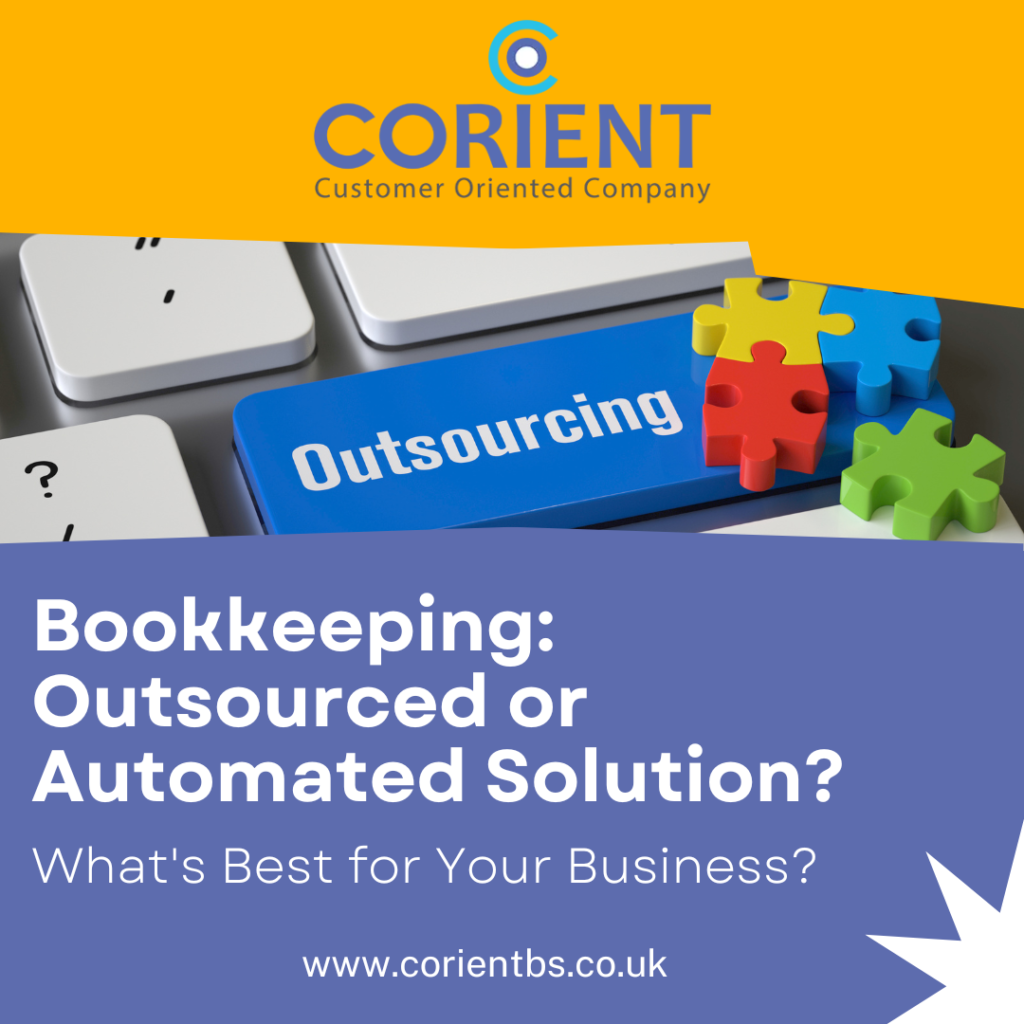Managing your business’s finances efficiently is crucial for long-term success. Two popular methods for handling bookkeeping are outsourcing and automation. Both have their unique advantages and disadvantages. This article will explore the differences between outsourced bookkeeping and automated bookkeeping, helping you decide which approach is best for your business.
Understanding Outsourced Bookkeeping
Outsourced bookkeeping means bringing in an external firm or professional to take care of your business’s financial records. This method provides access to professional expertise without the need to manage an in-house team.
Advantages of Outsourced Bookkeeping:
- Expertise and Experience:
- Outsourced bookkeepers are typically well-versed in accounting standards, tax laws, and financial regulations. Their expertise ensures accuracy and compliance in financial reporting.
- Cost-Effectiveness:
- Hiring a full-time, in-house bookkeeper can be expensive due to salaries, benefits, and training costs. Outsourcing can be more affordable, particularly for small businesses or startups.
- Focus on Core Activities:
- By outsourcing bookkeeping, business owners and managers can focus on core operations and strategic planning, leaving financial management to the experts.
- Scalability:
- Outsourced services can easily scale with your business. As your financial needs grow, the provider can offer additional resources and services without the hassle of hiring more staff.
- Access to Advanced Tools:
- Many outsourced bookkeeping firms use advanced accounting software and tools that might be too costly for a small business to invest in independently.
Disadvantages of Outsourced Bookkeeping:
- Loss of Control:
- Outsourcing involves relinquishing some control over your financial processes. This can be a concern if the provider doesn’t fully align with your business’s needs and goals.
- Communication Barriers:
- Working with an external provider can sometimes lead to communication issues, especially if the provider is in a different time zone or country.
- Data Security Risks:
- Sharing sensitive financial information with an external party always carries some risk. It’s crucial to ensure the provider has robust data security measures in place.
Understanding Automated Bookkeeping
Automated bookkeeping utilizes software and technology to manage financial transactions and records. This approach can significantly reduce the need for human intervention, making processes faster and potentially more accurate.
Advantages of Automated Bookkeeping:
- Efficiency and Speed:
- Automated systems can process transactions and generate reports much faster than manual methods. This efficiency is very high.
- Cost Savings:
- Once implemented, automated systems can reduce the need for a large accounting staff, leading to significant cost savings.
- Accuracy:
- Automation reduces the risk of human error in data entry and calculations, ensuring more accurate financial records.
- Real-Time Updates:
- Automated bookkeeping systems provide real-time updates on financial transactions, allowing for more timely and informed decision-making.
- Integration Capabilities:
- Many automated bookkeeping systems can integrate with other business software, such as CRM and ERP systems, creating a seamless flow of information across the organization.
Disadvantages of Automated Bookkeeping:
- Initial Setup Costs:
- Implementing automated bookkeeping systems can involve significant upfront costs for software, hardware, and training.
- Technical Issues:
- Automated systems can experience technical glitches or downtime, which can disrupt financial processes. Regular maintenance and updates are required to keep the system running smoothly.
- Limited Flexibility:
- While automation handles routine tasks well, it might struggle with complex or unusual transactions that require human judgment and expertise.
- Learning Curve:
- Employees may need time to learn and adapt to new automated systems, which can temporarily impact productivity.
Which Is Best for Your Business?
Deciding between outsourced bookkeeping and automated bookkeeping depends on various factors, including the size of your business, budget, and specific needs.
Consider Outsourced Bookkeeping If:
- You Need Expertise:
- If your business requires specialized knowledge in accounting and tax laws, outsourcing provides access to experienced professionals.
- You Want to Focus on Core Activities:
- Outsourcing allows you to delegate financial management, freeing up time to concentrate on growing your business.
- You Prefer Flexibility:
- Outsourcing can be scaled up or down based on your business needs, providing flexibility without the need for hiring and training new staff.
Consider Automated Bookkeeping If:
- You Handle High Transaction Volumes:
- Automation is ideal for businesses with high volumes of routine transactions, as it can process these quickly and accurately.
- You Seek Cost Savings:
- Over time, automation can reduce labor costs and improve efficiency, leading to significant savings.
- You Want Real-Time Financial Insights:
- Automated systems provide real-time updates, allowing you to monitor your financial health continuously and make informed decisions.
Hybrid Approach:
A hybrid approach blending outsourced accounting services with automation can be highly effective for businesses. Automation streamlines routine tasks, while outsourced experts tackle more complex financial activities. This combination helps optimize costs, enhance accuracy, and ensure thorough financial management. By leveraging both methods, businesses can achieve efficient, accurate, and comprehensive financial oversight.
Conclusion
Both outsourced bookkeeping and automated bookkeeping have their distinct advantages and potential drawbacks. The best choice for your business depends on your specific needs, resources, and goals. By carefully evaluating the benefits and limitations of each approach, you can make an informed decision that enhances your financial management and supports your business growth.


